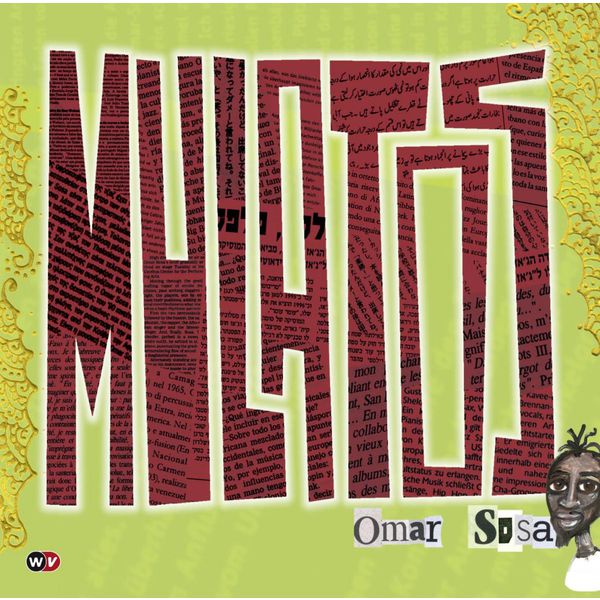
Musik-Streaming
Hören Sie dieses Album mit unseren Apps in hoher Audio-Qualität
Testen Sie Qobuz kostenlos und hören Sie sich das Album anHören Sie dieses Album im Rahmen Ihres Streaming-Abonnements mit den Qobuz-Apps
Abonnement abschließenHören Sie dieses Album im Rahmen Ihres Streaming-Abonnements mit den Qobuz-Apps
Download
Kaufen Sie dieses Album und laden Sie es in verschiedenen Formaten herunter, je nach Ihren Bedürfnissen.
In various interviews, salsa/Latin jazz master Ray Barretto has complained about hard bop artists who employ Afro-Cuban rhythms in a very obvious way -- artists who will take a familiar Thelonious Monk, Clifford Brown, or Bud Powell standard and "Latinize" it by adding a son, cha cha, mambo, danzon, or guaguancó groove. There is nothing wrong with that approach (which can be quite enjoyable), but there is also something to be said for using Afro-Cuban/salsa elements in a less obvious fashion -- which is what Omar Sosa does on Mulatos. This post-bop release doesn't beat listeners over the head with Afro-Cuban rhythms, but they're present nonetheless. They enrich Sosa's material in their own subtle way, and the Cuban pianist/keyboardist (who employs Paquito D'Rivera as a clarinetist on three selections) demonstrates that Afro-Cuban jazz doesn't have to be something as overt as playing Monk's "Well, You Needn't" as a descarga (Latin jam) or approaching George Gershwin's "I Can't Get Started" as a bolero (Latin ballad). Afro-Cuban music isn't the only type of world music that inspires Sosa on Mulatos, which was recorded in Paris in early 2004; Sosa also brings elements of Middle Eastern, North African, and Indian music to his post-bop. Dhafer Youssef (one of the sidemen) is featured on the oud, a traditional Arabic lute that is quite legendary in Middle Eastern music -- and Philippe Foch, another participant, appears on Indian tabla drums. Of course, the oud and the tablas aren't exactly prominent instruments in Afro-Cuban jazz or salsa, but they're major assets on Mulatos -- an album that paints a consistently attractive picture of Sosa's multicultural outlook. Mulatos is yet another broad-minded project that Sosa can be proud to have in his catalog.
© Alex Henderson /TiVo
Sie hören derzeit Ausschnitte der Musik.
Hören Sie mehr als 100 Millionen Titel mit unseren Streaming-Abonnements
Hören Sie diese Playlist und mehr als 100 Millionen Tracks mit unseren Streaming-Abonnements
Ab 12,49€/Monat

Albumbeschreibung
In various interviews, salsa/Latin jazz master Ray Barretto has complained about hard bop artists who employ Afro-Cuban rhythms in a very obvious way -- artists who will take a familiar Thelonious Monk, Clifford Brown, or Bud Powell standard and "Latinize" it by adding a son, cha cha, mambo, danzon, or guaguancó groove. There is nothing wrong with that approach (which can be quite enjoyable), but there is also something to be said for using Afro-Cuban/salsa elements in a less obvious fashion -- which is what Omar Sosa does on Mulatos. This post-bop release doesn't beat listeners over the head with Afro-Cuban rhythms, but they're present nonetheless. They enrich Sosa's material in their own subtle way, and the Cuban pianist/keyboardist (who employs Paquito D'Rivera as a clarinetist on three selections) demonstrates that Afro-Cuban jazz doesn't have to be something as overt as playing Monk's "Well, You Needn't" as a descarga (Latin jam) or approaching George Gershwin's "I Can't Get Started" as a bolero (Latin ballad). Afro-Cuban music isn't the only type of world music that inspires Sosa on Mulatos, which was recorded in Paris in early 2004; Sosa also brings elements of Middle Eastern, North African, and Indian music to his post-bop. Dhafer Youssef (one of the sidemen) is featured on the oud, a traditional Arabic lute that is quite legendary in Middle Eastern music -- and Philippe Foch, another participant, appears on Indian tabla drums. Of course, the oud and the tablas aren't exactly prominent instruments in Afro-Cuban jazz or salsa, but they're major assets on Mulatos -- an album that paints a consistently attractive picture of Sosa's multicultural outlook. Mulatos is yet another broad-minded project that Sosa can be proud to have in his catalog.
© Alex Henderson /TiVo
Informationen zu dem Album
- 1 Disc(s) - 9 Track(s)
- Gesamte Laufzeit: 00:55:28
- Künstler: Omar Sosa
- Label: world village
- Herkunft: Cuba
- Genre: Jazz Latin Jazz
 Warum Musik bei Qobuz kaufen?
Warum Musik bei Qobuz kaufen?
-
Streamen oder downloaden Sie Ihre Musik
Kaufen Sie ein Album oder einen einzelnen Track. Oder hören Sie sich mit unseren hochqualitativen Streaming-Abonnements einfach den ganzen Qobuz-Katalog an.
-
Kein DRM
Die heruntergeladenen Daten gehören Ihnen ohne jegliche Nutzungsbeschränkung. Sie können sie sooft herunterladen wie Sie möchten.
-
Wählen Sie das Format, das am Besten zu Ihnen passt
Sie können beim Download Ihrer Einkäufe zwischen verschiedenen Formaten (FLAC, ALAC, WAV, AIFF...) wählen.
-
Hören Sie Ihre Einkäufe mit unseren Apps
Installieren Sie die Qobuz-Apps für Smartphones, Tablets und Computer und hören Sie Ihre Musikeinkäufe immer und überall.



